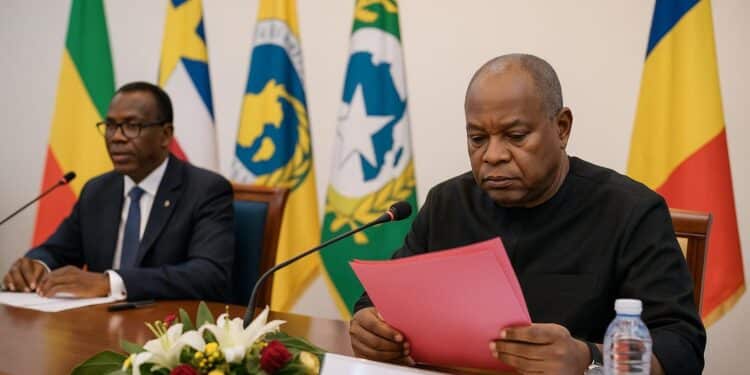Brazzaville Ministers Endorse Enlarged Budget
In the marble hall of Brazzaville’s ministry complex, the forty-fourth ordinary session of the Central African Economic and Monetary Community council of ministers closed with a unanimous vote for a 2026 budget of CFA 85.923 billion, cementing regional commitments.
Chaired by Congo-Brazzaville’s finance minister Ludovic Ngatsé, the meeting gathered delegates from Cameroon, Central African Republic, Chad, Equatorial Guinea, Gabon and the host country under the theme “toward programme-based community budgeting”, signalling a further shift toward performance metrics.
Brazzaville’s Diplomatic Significance
Hosting the meeting elevates Brazzaville’s status as a diplomatic hub, complementing its role in recent OPEC+ and African Union gatherings. Local authorities leveraged the event to showcase upgraded conference facilities and ongoing urban renewal along the Congo River.
Hoteliers reported full occupancy, while small businesses benefited from delegations’ spending, underlining the multiplier effect of regional events. Analysts note that such visibility can bolster Congo-Brazzaville’s bid to attract conference tourism and related service investments.
A Delicate 2.42 Percent Increase
The approved envelope represents a 2.42 percent nominal uptick from the 2025 figure of CFA 83.891 billion. Commissioners framed the rise as modest, designed to preserve fiscal discipline while giving room to finish previously launched integration projects.
Accounting officers briefed ministers that operating expenditure remains capped, with incremental resources channelled to capital outlays. The budget text asks each institution to present quarterly execution dashboards, a measure intended to reassure both parliaments and external partners.
Fodec Edges Toward Investment Vehicle
A separate line of CFA 18.456 billion will flow to the Community Development Fund, Fodec. President of the Commission Baltasar Engonga Edjo’o told reporters the fund is “evolving from grant provider to true investment arm, crowding in private capital”.
Technical teams have been mandated to prepare a pipeline of bankable projects before mid-2026, covering transport corridors, agri-value chains and energy interconnections. Officials believe the pivot will help absorb excess liquidity in regional banking systems.
Persistent TCI Collection Headwinds
Financing, however, rests largely on the Community Integration Levy, or TCI, a charge collected at customs in every member state. Collection remains patchy; average remittance rates are under 60 percent, according to the internal auditor’s report tabled in Brazzaville.
Ministers endorsed the autonomous recovery mechanism adopted in 2023 and asked the Commission to dispatch mobile missions to revenue departments. The objective is to close compliance gaps without adding layers of bureaucracy or hampering legitimate trade flows.
Audit Architecture Gains Teeth
Governance standards drew particular attention. After noting weaknesses in prior audits, the council approved the creation of a standing audit committee, compulsory annual external audits and accelerated drafting of procedure manuals across all organs.
Engonga Edjo’o welcomed the decision, stressing that “credible controls are indispensable to maintain donor confidence and unlock new concessional windows”. The committee will report directly to the ministers, a first in the bloc’s two-decade history.
Priority Projects: Free Roaming and CAPS
On the policy front, two integrative projects received political momentum. The Free Roaming initiative aims to scrap surcharges on mobile calls within CEMAC, while the CAPS hydro-energy scheme promises additional baseload capacity and lower tariffs.
Ngatsé urged administrations to finalise technical specifications and financing before the next ministerial council, arguing that “connectivity and energy sit at the core of competitiveness”. Both projects have been classified as priority under the Programme of Integrated Projects.
Macroeconomic Outlook Endorsed
The session adopted the 2024 multilateral surveillance report, offering cautiously optimistic macro projections for 2025-2026. Regional growth is expected to stay positive, buoyed by hydrocarbons, timber processing and gradual recovery in services.
Debt ratios remain broadly sustainable, though the report cautions against exchange-rate volatility and external shocks. Ministers asked national treasuries to refine medium-term fiscal frameworks consistent with community convergence criteria.
Investor Takeaways from the 2026 Envelope
For investors, the new budget signals continuity rather than rupture. The modest expansion, coupled with tighter auditing, suggests the bloc is seeking to de-risk its operating environment, an important message for lenders evaluating sovereign and sub-sovereign exposures.
The forthcoming investment-oriented Fodec could become a cornerstone for blended finance structures, particularly in green infrastructure where private appetite grows. Asset managers will watch whether pipeline preparation meets international standards of environmental and social governance.
Member States Called to Action
Beyond boardrooms, the council’s communique called on governments, private sector and civil society to shoulder collective responsibility. Ministers reiterated the prohibition on exporting unprocessed tropical logs, inviting national legislatures to enact enforcement decrees swiftly.
As gavel fell, Ngatsé summed up the mood: “Our resolutions matter only once translated into field action”. With timelines now clearly stated, the coming months will test the region’s ability to turn budgetary intent into palpable integration gains.











































